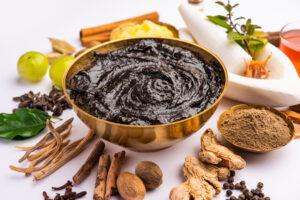Benefits and Contraindications of Shilajit – The Nutritional Powerhouse you Probably Don’t Know About:

Shilajit, a sticky resin found primarily in the Himalayan mountains, has been used for centuries in traditional medicine, especially in Ayurvedic practices. Here are three notable benefits of Shilajit:
1. Boosts Energy and Stamina
Shilajit is known to enhance physical performance by increasing mitochondrial function, which leads to improved energy production in cells. It helps to boost stamina and endurance, making it particularly useful for athletes or individuals with high physical demands. It is believed to reduce fatigue and increase vitality, providing more sustained energy throughout the day.
2. Supports Cognitive Function
Shilajit contains fulvic acid, which has been shown to improve cognitive function. It is thought to help in the regeneration of brain cells, enhance memory, and possibly slow the aging process of the brain. It has been used in traditional medicine to support mental clarity and focus, and may also help reduce symptoms associated with Alzheimer’s and dementia due to its neuroprotective properties.
3. Promotes Anti-Aging and Skin Health
The high concentration of minerals, vitamins, and antioxidants in Shilajit contributes to its anti-aging effects. Fulvic acid, in particular, is a powerful antioxidant that helps in neutralizing free radicals and reducing oxidative stress, which is a major cause of aging. Shilajit is also said to promote skin health, reduce wrinkles, and improve overall skin tone by enhancing collagen production and promoting the detoxification of the skin.
These benefits make Shilajit a popular supplement in traditional health practices, though it’s always important to consult a healthcare professional before using any new supplement, especially due to its potency and potential side effects.
Yes, while Shilajit is generally considered safe for many people, there are some contraindications and precautions to be aware of. Since it is a powerful substance with many bioactive compounds, it can interact with certain health conditions or medications. Here are some key contraindications and considerations:
1. Pregnancy and Breastfeeding
- Not recommended for pregnant or breastfeeding women, as there is insufficient research on its safety during these periods. The potency of Shilajit could potentially interfere with hormonal balance or affect fetal development, so it’s best to avoid it unless under the guidance of a healthcare professional.
2. Pre-existing Medical Conditions
- Hemochromatosis (Iron Overload): Shilajit can increase iron absorption, which could be problematic for individuals with hemochromatosis (a condition where the body absorbs too much iron). High iron levels can damage organs over time, so people with this condition should avoid Shilajit or use it with caution under medical supervision.
- Kidney Disorders: Some forms of Shilajit may contain heavy metals or impurities if not properly purified. People with kidney conditions or impaired kidney function should avoid Shilajit or use it only under the strict supervision of a healthcare provider to prevent any potential kidney strain.
- Low Blood Pressure (Hypotension): Shilajit may have the effect of lowering blood pressure, which could be problematic for individuals who already have low blood pressure or are taking medications to lower blood pressure. This could lead to dizziness, fainting, or other complications.
3. Drug Interactions
- Antidiabetic Medications: Shilajit may help lower blood sugar levels, so combining it with antidiabetic drugs could cause blood sugar to drop too low (hypoglycemia). People on diabetes medications should monitor their blood sugar levels closely when using Shilajit and consult their healthcare provider for dosage adjustments.
- Blood Pressure Medications: Due to its potential to lower blood pressure, Shilajit may interact with antihypertensive medications, potentially causing an excessive drop in blood pressure.
- Blood Thinners: Shilajit can also have mild anticoagulant (blood-thinning) effects. If you’re taking medications like warfarin or aspirin, it could increase the risk of bleeding or bruising.
4. Purity of the Product
- Contamination: The quality and purity of Shilajit can vary, and if it contains contaminants such as heavy metals (e.g., lead, arsenic), it can be toxic. It’s important to buy Shilajit from a reputable source that tests for contaminants and ensures the product is properly purified. Unregulated or low-quality Shilajit can have adverse effects, particularly on the liver and kidneys.
5. Dosage
- Overuse of Shilajit could potentially lead to side effects like upset stomach, nausea, or dizziness. Stick to recommended dosages, and if you’re unsure about how much to take, consult a healthcare provider.
General Advice:
- Consult a Healthcare Provider: Always check with a doctor or healthcare provider before using Shilajit, especially if you have any pre-existing health conditions or are taking prescription medications.
- Start Small: If you do decide to try Shilajit, it’s a good idea to start with a lower dose and see how your body responds.
In summary, while Shilajit has numerous health benefits, it’s important to use it cautiously and be aware of potential contraindications, especially if you have certain health conditions or are on specific medications. Always prioritize quality and purity when choosing a Shilajit supplement.

